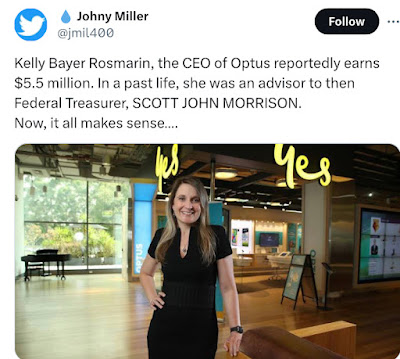A lifetime of building an empire can fall in a day because of the wrong successor to the empire.
~ STRONG by Kailin Gow
A dynasty is nothing but the successful orchestration of treachery.
~ Stewart Stafford
Epilogue:
Optus CEO Kelly Bayer Rosmarin resigns
The science of the successful succession
Few things are certain, but the ephemerality of chief executives is one of them
Optus chief executive Kelly Bayer Rosmarin made it through the cyberhacking incident.
History shows that the chief executive presiding over a crisis rarely survives one let alone two. Regardless of whether they are directly culpable, they are considered accountable.
Optus boss Kelly Bayer Rosmarin made it through the cyberhacking affair in part because she had the backing of Optus offshore owner SingTel, rather than a bunch of Australian institutional shareholders.
It remains to be seen whether the Singaporean owners will view this as an incident outside Bayer Rosmarin’s control and close their ears to the social media lynching mob that is baying for a scalp. Bayer Rosmarin, who became a household name during the cyberattack, is an ambitious, tenacious and self-confident executive who is no stranger to networking in the Australian business community. In September, she joined fellow directors on the REA Group board in Europe for some offsite fact-finding (and attended a Rugby World Cup game), and the previous month she joined iron ore billionaire Andrew Forrest’s wild party in the Pilbara to celebrate Fortescue’s 20th birthday. She was also front and centre during the Matilda’s quest for the FIFA World Cup, to which Optus held the broadcasting rights. History shows that the chief executive presiding over a crisis rarely survives one let alone two.
During interviews on Wednesday, Bayer Rosmarin didn’t respond to questions on her own corporate future. But it’s worth noting that when Telstra experienced a similar major outage in 2016, its then-chief executive Andy Penn weathered that storm and retained his position.
If there is only one (albeit) small silver lining to Wednesday’s Australia-wide outage, it is that Bayer Rosmarin should have been able to learn from the mistakes made last year during the cyberattack.
The key to her response is communication – something that logic suggests should have come naturally to a communications company chief executive. During the cyberattack, a lack of regular disclosure to customers and the public created an information void – which politicians were eager to fill. The government was ready with a sledgehammer – feeding off information from cyber experts who were convinced that Optus should shoulder some blame for its substandard fortification from attack, which made it vulnerable to cyber thieves.
Even now, we don’t really know whether Optus was culpable – it says it wasn’t. But the investigation report from Deloitte that would provide those answers was kept under wraps.
Optus has relied on legal professional privilege as a defence for not revealing the details, adding that it might also leave it vulnerable to future cyberattacks.
It should have thought of this when it indicated earlier that it would make the report public and when its chairman told shareholders that it would be transparent.
'Too early' to know what compensation available to Optus customers Communications Minister Michele Rowland says it's too early to know what compensation will be available to Optus customers impacted by the massive outage. The absence of any even edited version of the Deloitte findings only serves to suggest that Optus didn’t like what was in the report.
What this week’s outage has demonstrated is that Optus was again tardy with timely information.
These crises are fluid so constant updates are important. Retail and commercial customers are at best disadvantaged every minute they are deprived of digital breath – at worst they are commercially crippled. As Telstra chief in 2016, Andy Penn kept his position after a widespread outage.
As a community, many more than just customers were impacted as trains drew to a halt and some hospitals lost vital communications.
But in the early hours of the disaster, Bayer Rosmarin was hard to find, social media posts were brief and many of the customers couldn’t access them because they had no phone or internet connection. In Optus’ defence, it wasn’t sure what had caused the problem or how long it would take to fix.
By the time Bayer Rosmarin took to commercial radio around lunchtime, she could proclaim the good news that services had begun being restored. The question that now needs answering is whether this was a problem of Optus’ own making or just one of the perils faced in running a huge complex network. Has it invested sufficiently in its IT infrastructure?
PS:8 Nov 2023 @StephenKing



